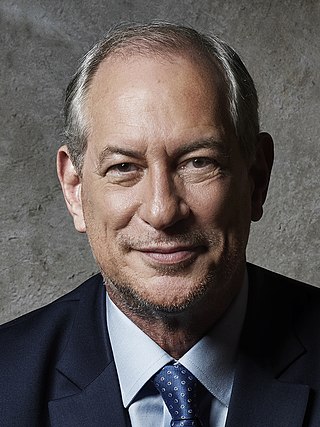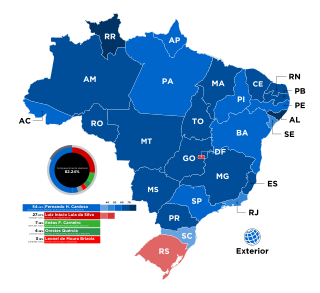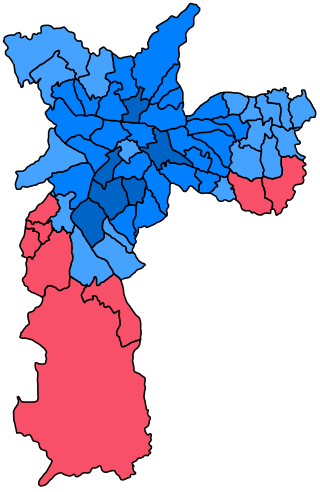Related Research Articles

Geraldo José Rodrigues Alckmin Filho is a Brazilian physician and politician currently serving as 26th vice president of Brazil. He previously was the Governor of São Paulo for two nonconsecutive terms, the longest serving since democratization, 2001 to 2006 and 2011 to 2018.

Ciro Ferreira Gomes, known mononymously as Ciro, is a Brazilian politician, lawyer, and academic. Ciro is currently affiliated with and vice-president of the Democratic Labour Party (PDT).

The Homeless Workers Movement is a social movement in Brazil. It originated from the Movimento dos Trabalhadores Rurais Sem Terra. Although the MTST can trace its first urban activism efforts to the occupation of Campinas in São Paulo during the 1997 National People's March, this intervention was organized within the Landless Rural Worker's Rural Movement (MST) structure. The first proper occupation as a new sociopolitical actor, distinct from the MST, took place in Guarulhos in 2002. It was named after Anita Garibaldi, considered to be a radical social reformer during her lifetime.

Fernando Haddad is a Brazilian scholar, lawyer and politician who has served as the Brazilian Minister of Finance since 1 January 2023. He was previously the mayor of São Paulo from 2013 to 2017 and the Brazilian minister of education from 2005 to 2012.

General elections were held in Brazil on October 3, 1994, the second to take place under the provisions of the 1988 constitution and the second direct presidential election since 1960.

Corruption in Brazil exists on all levels of society from the top echelons of political power to the smallest municipalities. Operation Car Wash showed central government members using the prerogatives of their public office for rent-seeking activities, ranging from political support to siphoning funds from state-owned corporation for personal gain. The Mensalão scandal for example used taxpayer funds to pay monthly allowances to members of congress from other political parties in return for their support and votes in congress. Politicians also used the state-owned and state-run oil company Petrobras to raise hundreds of millions of reais for political campaigns and personal enrichment.

General elections were held in Brazil on 7 October 2018 to elect the president, National Congress and state governors. As no candidate in the presidential election received more than 50% of the vote in the first round, a runoff round was held on 28 October.

The 2017 Brazilian general strike took place on 28 April, 100 years after Brazil's first general strike in June 1917. The movement was a protest against reforms of labor laws, which were later adopted and social security proposed by Michel Temer government and pending in National Congress of Brazil.

Events in the year 2018 in Brazil.

The 2020 São Paulo municipal election took place in the city of São Paulo, Brazil, with the first round taking place on 15 November 2020 and the second round taking place on 29 November 2020. Voters voted to elect the Mayor, the Vice Mayor and 55 city councillors for the administration of the city. The result was a 2nd round victory for incumbent Mayor Bruno Covas of the Brazilian Social Democratic Party (PSDB), winning 3,169,121 votes and a share of 59,38% of the popular vote, defeating political activist Guilherme Boulos of the Socialism and Liberty Party (PSOL), who took 2,168,109 votes and a share of 40.62% of the popular vote.

Since the 2018 Brazilian general election, polling companies have published surveys tracking voting intention for the next election. The results of these surveys are listed below in reverse chronological order and include candidates who frequently polled above 3%.

Events in the year 2021 in Brazil.

The 2021 Brazilian protests were popular demonstrations that took place in different regions of Brazil in the context of the COVID-19 pandemic. Protests both supporting and opposing the government happened.
Bruno Donizati Sartori, also known as Bruxo dos Vídeos, is a Brazilian journalist, comedian and influencer marketing considered one of the pioneers in creating satires through the deepfake technique in Brazil. Sartori has gained notoriety with videos that satirize public entities such as Jair Bolsonaro, Sergio Moro, and Lula.

The Brazil Union is a liberal-conservative political party in Brazil. The party was founded on 6 October 2021 through the merger of the Democrats (DEM) and the Social Liberal Party (PSL). The merger resulted in the biggest party in Brazil, and was approved by Brazil's Superior Electoral Court on 8 February 2022.

The 2022–2023 Brazilian election protests began shortly after the conclusion of the 2022 Brazilian general election's second round on 30 October, in which Luiz Inácio Lula da Silva was elected president, which led to mass protests and roadblocks nationwide. Supporters of Jair Bolsonaro, who are frequently referred to in media accounts as Bolsonaristas, alleging election fraud, began blocking roads and highways in the country. At least 23 Brazilian states, plus the Federal District, recorded roadblocks as of 1 November, adding up to at least 267 roadblocks according to data from Federal Highway Police (PRF).
General elections will be held in Brazil on 4 October 2026 to elect the president, vice president, members of the National Congress, the governors, vice governors, and legislative assemblies of all federative units, and the district council of Fernando de Noronha. If no candidate for president or governor receives a majority of the valid votes in the first round, a runoff election is held on 25 October.

The Supreme Federal Court Palace is the seat of the Supreme Federal Court, Brazilian highest appealing court and constitutional court. It was designed by architect Oscar Niemeyer and the structural project was carried out by engineer Joaquim Cardozo.
Paulo Roberto Franco Marinho is a Brazilian businessman, executive and politician affiliated with the Republicans. He worked in the financial market, in the shipbuilding industry, as a communications executive and became a well-known and influential figure in the society of Rio de Janeiro.

Douglas Belchior is a Brazilian activist.
References
- 1 2 Carvalho, Sonia Regina Ribeiro de (2007). A central de movimentos populares e o processo brasileiro de democratização: uma trajetória em construção – 1993–2003 (phD) (in Brazilian Portuguese). Pontifical Catholic University of São Paulo. S2CID 151955645.
- ↑ Aquino, Yara (5 September 2015). "Movimentos sociais lançam frente para propor o desenvolvimento do país" [Social movements launch front to propose the country's development]. Agência Brasil (in Brazilian Portuguese). Brasília . Retrieved 3 May 2020.
- 1 2 "Cry of the Excluded denounces violence, cost of living, and Lula's prison in Brazil". Brasil de Fato. 7 September 2018. Retrieved 3 May 2020.
- ↑ "Cry of the Excluded brings tens of thousands to the streets of Brazil". Peoples Dispatch. 9 September 2019. Retrieved 3 May 2020.
- ↑ Oliveira, Marcelo (1 April 1997). "Sem-terra e sem-teto farão marcha" [Landless and homeless will march]. Folha de S.Paulo (in Brazilian Portuguese). São Paulo . Retrieved 3 May 2020.
- ↑ "Líderes vão ao DF para Caravana da Moradia" [Social leaders go to Brasilia to Caravana da Moradia]. Folha de S.Paulo (in Brazilian Portuguese). São Paulo. 19 May 1998. Retrieved 3 May 2020.
- ↑ "Movimentos populares protestam em SP contra privatizações e reformas" [Social movements protest in SP against privatizations and reforms]. G1 (in Brazilian Portuguese). São Paulo. 30 November 2017. Retrieved 3 May 2020.
- ↑ "Em defesa da soberania e contra privatizações de Bolsonaro e Doria, frente parlamentar é lançada em São Paulo" [In defense of sovereignty and against privatizations of Bolsonaro and Doria, parliamentary front is launched in São Paulo]. Rede Brasil Atual (in Brazilian Portuguese). São Paulo. 20 September 2019. Retrieved 3 May 2020.
- ↑ Brian Mier (13 November 2017). "The State of the Brazilian Left: Analysis from an American in Brazil". Council on Hemispheric Affairs. Retrieved 3 May 2020.
- ↑ Nation Nyoka (12 November 2019). "Lula da Silva is free and fighting fit". Mail & Guardian. Retrieved 3 May 2020.